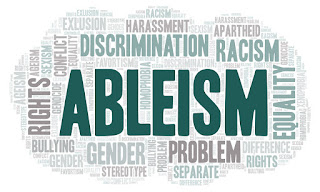In a previous blog post, I've written about use of the term woke and its associated vocabulary:
The woke dictionary is a way to soften speech in our "fear of offending" culture. Calling out others for using "dated" and "problematic language" is how students can virtue signal by showing off how sensitive they are. If you prequel anything slightly controversial with "speaking from a place of privilege," there's a better chance your peers won't label you a racist.
A new term, at least for me, that can be added to the woke dictionary is ableism as used in this context in a recent BBC article:
... disabled people experience widespread discrimination at nearly every level of society. This phenomenon, known as 'ableism' – discrimination based on disability – can take on various forms. Personal ableism might look like name-calling, or committing violence against a disabled person, while systemic ableism refers to the inequity disabled people experience as a result of laws and policy.
But ableism can also be indirect, even unintentional, in the form of linguistic micro-aggressions. As much as we all like to think we’re careful with the words we choose, ableist language is a pervasive part of our lexicon. Examples in pop culture are everywhere, and you’ve almost certainly used it yourself.
Frequently, ableist language (known to some as ‘disableist’ language) crops up in the slang we use, like calling something “dumb” or “lame”, or making a declaration like, “I’m so OCD!”. Though these might feel like casual slights or exclamations, they still do damage.
One can only smile at a phrase like "linguistic micro-aggression". Here is another definition of ableism taken from this source:
Ableism is the discrimination of and social prejudice against people with disabilities based on the belief that typical abilities are superior. At its heart, ableism is rooted in the assumption that disabled people require 'fixing' and defines people by their disability.
In the same vein, we have the words deadname and deadnaming that can be explained as follows:
A deadname is a trans person’s given or former name that they no longer use, also often referred to as a “given name” or “legal name”. While deadname is usually a noun, it’s also used, as in deadnaming, as a verb to refer to the act of using the wrong name for a trans person.
The above explanation is taken from a LifeHacker article. I don't want to dwell further on this sort of nonsense. Of course, demonstrating sensitivity to the evils of ableist language by avoiding its use in ones writing and conversation is described, somewhat pejoratively, as virtue signalling:
the action or practice of publicly expressing opinions or sentiments intended to demonstrate one's good character or the moral correctness of one's position on a particular issue
I won't go into the social ramifications of this sort of linguistic madness as this post is intended to simply draw attention to the meaning of the terminology.











